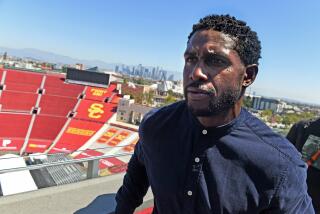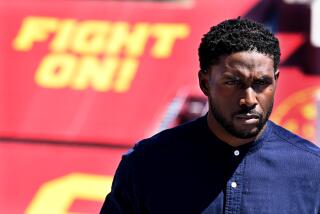Huskies’ Suit Challenges Pac-10 Football Penalties
- Share via
Like most University of Washington football fans, Ron Neubauer thinks his beloved Huskies got a raw deal when they were banned from bowls for two years by the Pacific 10 Conference.
“All you have to do is read the penalties meted out to Syracuse, Auburn, Texas A&M; and UNLV,” he said, citing several infractions cases recently processed by the NCAA.
It is the old argument: The punishment doesn’t fit the crime.
But Neubauer isn’t just blowing smoke when he says the Pac-10 was way out of line. A Seattle attorney who has done legal work for Husky coaches and players, he is hoping to make his case in front of a jury in federal court.
Neubauer is representing a variety of plaintiffs, including five Washington football players, who have filed a class-action suit against the Pac-10 in U.S. District Court in Seattle.
The suit, filed Dec. 15, stems from the conference’s ruling last August that the Huskies would be prohibited from appearing in bowls after the 1993 and ’94 seasons as a result of NCAA rules violations. The ruling so angered Washington Coach Don James that he resigned.
Chief among the suit’s claims is the contention that the conference’s investigation of the Washington program violated the due process rights of Husky players. The suit seeks an injunction lifting the sanctions against the university.
The Pac-10 is the only major conference that investigates and rules on infractions cases. The Washington suit marks the first time that a Pac-10 infractions case has been challenged in court.
Although a trial date has been set for Oct. 3, Pac-10 officials believe the suit lacks legal standing and will be dismissed.
“I do not think it will go (to trial),” said Tom Hansen, Pac-10 commissioner.
Still, the suit is clearly an irritant for the conference, reviving a touchy situation that coaches and administrators--including those at Washington--believed had been put to rest months ago.
“What bothers me,” said Chris Burford, Pac-10 legal counsel, “is the waste of money and resources for all involved. (The suit) kind of keeps this thing rolling around when half the penalties are already over.”
The conference’s legal fees, which could reach more than $100,000, will come from football and basketball television revenue that would otherwise have been distributed to the 10 conference schools, Hansen said.
But the larger issue, in Hansen’s view, is one of perception.
“I don’t think (the suit) impacts the conference particularly, but I definitely think it impacts the University of Washington,” he said. “One of the reasons why the conference members want the conference to conduct this (enforcement) program is because we can close these cases down as quickly as possible, get our problems resolved or eliminated . . .
“Now, because of this (lawsuit), the (Washington) case has a continuing public presence.”
When the suit was filed, the school noted its opposition in a two-sentence statement by James Collier, vice president for university relations.
“The University of Washington is not a party to the lawsuit . . . nor does the university support it,” Collier said in the statement.
The Seattle Times, in an editorial, later urged the university to take a stronger stand against the suit, which the newspaper described as “misguided” and “specious.”
The editorial stated: “The Pac-10 didn’t make an improper loan to former (Husky) quarterback Billy Joe Hobert. It did not give jobs to athletes and expect no work. Overzealous boosters were the villains. They are the ones who fouled up the program.”
According to sources within the university and the conference, Washington officials, while strongly opposed to the suit, have taken a relatively low-key approach because of the involvement of the five players, all of whom have eligibility remaining.
Named as plaintiffs are guard Frank Garcia, running back Jovan McCoy, linebacker Jaime Weindl and defensive backs Russell Hairston and Kyle Roberts. Also named as plaintiffs are two businesses that sell Husky merchandise, and a Washington season-ticket holder.
McCoy told the Seattle Times that most Husky players support the suit.
“We took the final count at the (team) banquet,” he said. “Russell (Hairston) took the (vote). If the majority of the players said no, we weren’t going to do it.”
Neubauer is no stranger to the Pac-10 enforcement process. He was drawn into the Washington inquiry through his representation of Seattle businessman Herb Mead, a prominent Husky booster and key figure in the investigation.
Neubauer said he became involved in the lawsuit when “concerned parents” of Husky players came to him for advice. “This has absolutely nothing to do with the boosters,” he said. “The genesis of this case came from parents of players--present players--including the parents of some of the five (bringing the suit).”
Neubauer declined to identify the players whose parents approached him.
As for his fees, he said he and his co-counsel, Henry Jameson, took the case strictly on a contingency basis. “We think we’re going to win,” he said.
If nothing else, the lawsuit is a compilation of many of the issues that inflamed Washington supporters when the sanctions were announced last summer.
The suit states that Pac-10 administrators and chief executive officers, who have the final say in infractions matters, cannot discipline conference members “without both the appearance and the reality of prejudice.”
The suit also claims that the Pac-10 has no rules governing its investigations and did not adhere to guidelines governing NCAA investigations in its handling of the Washington case.
According to the suit, Pac-10 investigator David Price “made no pretense of impartiality,” openly stating that he believed allegations of impropriety reported by The Los Angeles Times to be true and that he intended to prove them.
Price, Pac-10 associate commissioner, would not comment except to say: “I’ve taken the position that this is in the hands of the lawyers. The (enforcement) process was fair, and we’ll vigorously defend it.”
The conference is expected to file a motion for dismissal today on grounds that the plaintiffs have no standing without the involvement of the university.
Al Van Kampen, a Seattle attorney representing the Pac-10 in the matter, cited several cases in which courts have ruled against athletes who brought suits as a result of NCAA sanctions against their schools. “The courts, as a rule, do not interfere (with NCAA infractions rulings),” he said.
A ruling on the conference’s motion could come next month, Van Kampen said.
Meanwhile, Ron Neubauer readies for a fight. He expects to tell a jury how the Pac-10 enforcement process went awry last year.
“We feel very fortunate and happy that the judge gave us an Oct. 3 trial date,” he said. “That gives us a chance to get this thing to trial and get it determined before the end of next season.
“I saw where Price or Hansen--one of those guys--said there’s a cloud hanging over the university because of this lawsuit. Well, we feel the cloud is hanging over the Pac-10.”
More to Read
Go beyond the scoreboard
Get the latest on L.A.'s teams in the daily Sports Report newsletter.
You may occasionally receive promotional content from the Los Angeles Times.










